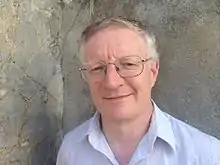Timothy Williamson
Timothy Williamson FRSE FBA (born 1955) is a British philosopher whose main research interests are in philosophical logic, philosophy of language, epistemology and metaphysics. He is the Wykeham Professor of Logic at the University of Oxford, and fellow of New College, Oxford.
Timothy Williamson | |
|---|---|
 Williamson in 2014 | |
| Born | 6 August 1955 Uppsala, Sweden |
| Nationality | British |
| Academic background | |
| Alma mater | Balliol College, Oxford |
| Thesis | The Concept of Approximation to the Truth (1980) |
| Influences | Ruth Barcan Marcus |
| Academic work | |
| Discipline | Philosophy |
| Sub-discipline | |
| School or tradition | Analytic philosophy |
| Institutions | |
| Doctoral students | |
| Main interests | Fuzzy logic |
| Notable ideas |
|
| Influenced | |
Education and career
Born on 6 August 1955, Williamson's education began at Leighton Park School and continued at Henley Grammar School (now the Henley College). He then went to Balliol College, Oxford University. He graduated in 1976 with a Bachelor of Arts degree with first-class honours in mathematics and philosophy, and in 1980 with a doctorate in philosophy (DPhil) for a thesis entitled The Concept of Approximation to the Truth.[1]
Prior to taking up the Wykeham Professorship in 2000, Williamson was Professor of Logic and Metaphysics at the University of Edinburgh (1995–2000); fellow and lecturer in philosophy at University College, Oxford (1988–1994); and lecturer in philosophy at Trinity College, Dublin (1980–1988).
He was president of the Aristotelian Society from 2004 to 2005.
He is a Fellow of the British Academy (FBA),[2] the Norwegian Academy of Science and Letters,[3] Fellow of the Royal Society of Edinburgh (FRSE), and a Foreign Honorary Fellow of the American Academy of Arts & Sciences.
Philosophical work
Williamson has contributed to analytic philosophy of language, logic, metaphysics and epistemology.
On vagueness, he holds a position known as epistemicism, which states that every seemingly vague predicate (like "bald" or "thin") actually has a sharp cutoff, which is impossible for us to know. For instance, there is some number of hairs such that anyone with that number is bald, and anyone with even one more hair is not. In actuality, this condition will be spelled out only partly in terms of numbers of hairs, but whatever measures are relevant will have some sharp cutoff. This solution to the difficult sorites paradox was considered an astonishing and unacceptable consequence, but has become a relatively mainstream view since his defence of it.[4] Williamson is fond of using the statement, "no one knows whether I am thin" to illustrate his view.[5]
In epistemology, Williamson suggests that the concept of knowledge is unanalysable. This went against the common trend in philosophical literature up to that point, which was to argue that knowledge could be analysed into constituent concepts. (Typically this would be justified true belief plus an extra factor.) He agrees that knowledge entails justification, truth and belief, but argues that it is conceptually primitive. He accounts for the importance of belief by discussing its connections with knowledge, but avoids the disjunctivist position of saying that belief can be analysed as the disjunction of knowledge with some distinct, non-factive mental state.[6]
In metaphysics, Williamson defends necessitism, according to which necessarily everything is necessarily something, in short, that everything exists of necessity. Necessitism is associated with the Barcan formula: it is possible for something to have a property only if there is something which has that property. Thus, since it is possible for Wittgenstein to have had a child, there is something which is a possible child of Wittgenstein. However, Williamson has also developed an ontology of bare possibilia which he argues alleviates the worst consequences of necessitism and of the Barcan formula. It’s not that Wittgenstein’s possible child is concrete; rather, it is contingently non-concrete.
Publications
- Identity and Discrimination, Oxford: Blackwell, 1990.
- Vagueness, London: Routledge, 1994.
- Knowledge and Its Limits, Oxford: Oxford University Press, 2000.
- The Philosophy of Philosophy, Oxford: Blackwell, 2007.
- Modal Logic as Metaphysics, Oxford: Oxford University Press, 2013.
- Tetralogue: I'm Right, You're Wrong, Oxford: Oxford University Press, 2015.
- Doing Philosophy: From Common Curiosity to Logical Reasoning, Oxford University Press, 2017.
- Suppose and Tell: The Semantics and Heuristics of Conditionals, Oxford University Press, 2020.
Williamson has also published more than 120 articles in peer-reviewed scholarly journals.
References
- Timothy Williamson – New College, Oxford
- British Academy Fellowship record Archived 6 June 2011 at the Wayback Machine
- "Gruppe 3: Idéfag" (in Norwegian). Norwegian Academy of Science and Letters. Retrieved 16 January 2011.
- Zalta, Edward N. (ed.). "Vagueness". Stanford Encyclopedia of Philosophy.
- Phil 2511: Paradoxes
- Williamson, Timothy (10 October 2002). Knowledge and its Limits. Oxford University Press. doi:10.1093/019925656x.001.0001. ISBN 9780199256563.
External links
- Profile at University of Oxford
- An in-depth autobiographical interview with Timothy Williamson
- Interview at 3:AM Magazine
| Academic offices | ||
|---|---|---|
| Preceded by David Wiggins |
Wykeham Professor of Logic 2000–present |
Incumbent |
| Professional and academic associations | ||
| Preceded by Paul Snowdon |
President of the Aristotelian Society 2004–2005 |
Succeeded by Myles Burnyeat |